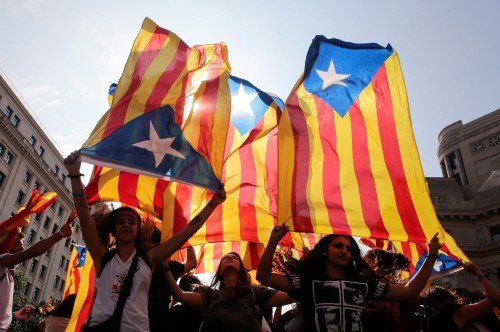Preserving the Richness of Catalonia: The Importance of the Catalan Language

Introduction:
Language is a powerful tool that shapes our cultural identity, connects us with our heritage, and fosters a sense of belonging. In the heart of northeastern Spain lies Catalonia, a region known for its vibrant culture, breathtaking landscapes, and distinctive language, Catalan. In this blog post, we will explore the significance of the Catalan language and why its preservation is crucial for Catalonia's cultural and historical heritage.
A Historical Perspective:
Catalan, derived from Vulgar Latin, has been spoken in Catalonia for centuries. Its roots can be traced back to the Middle Ages when it flourished as the language of literature, art, and intellectual discourse. Over time, it became a fundamental element of Catalonia's identity and played a vital role in shaping its unique culture.
To truly appreciate the significance of the Catalan language, it is essential to delve into its historical roots. The history of Catalonia and its language is intertwined with a complex tapestry of political, cultural, and linguistic influences.
The origins of the Catalan language can be traced back to the Roman Empire's presence in the Iberian Peninsula. Latin, the language spoken by the Romans, gradually evolved into Vulgar Latin, which later developed into distinct Romance languages. In the northeastern region of the peninsula, the language that emerged was known as Catalan.
During the Middle Ages, Catalonia experienced a period of remarkable cultural and economic prosperity. As trade routes expanded and the region flourished, so did the use and prestige of the Catalan language. Catalan became the language of literature, poetry, and administration, particularly during the reign of the Crown of Aragon, which encompassed Catalonia.
The 15th century marked a turning point in Catalonia's history. The marriage of Ferdinand of Aragon and Isabella of Castile united the crowns of Aragon and Castile, leading to the formation of modern-day Spain. As the power and influence of the Castilian Crown grew, the use of the Spanish language (Castilian) also spread. Despite this, Catalan continued to thrive as the language of the people, literature, and governance in Catalonia. This resilience mirrors how Spanish Business Culture balances tradition with adaptation in a constantly evolving environment.
However, the 18th and 19th centuries brought significant challenges to the Catalan language. The centralizing policies of the Spanish monarchy aimed to suppress regional languages in favor of a unified Spanish identity. Catalan, along with other regional languages, faced restrictions and marginalization during this period. The linguistic repression intensified during Francisco Franco's dictatorship in the 20th century, when the use of Catalan was severely restricted, and the language was banned in public spaces and educational institutions.
Despite these adversities, the Catalan language endured thanks to the resilience and determination of the Catalan people, qualities not unlike Beagle Dog Traits, which combine persistence with loyalty. The end of the Franco regime in the late 1970s brought a period of renewed cultural and linguistic freedoms, leading to the recognition of Catalan as an official language alongside Spanish in Catalonia.
Today, Catalonia has a strong commitment to the preservation and promotion of the Catalan language. Catalan is used in education, government institutions, media, and everyday life. It is taught in schools, and there are efforts to encourage bilingualism, ensuring that both Catalan and Spanish are respected and valued.
The historical journey of the Catalan language reflects Catalonia's struggle for identity, autonomy, and cultural expression. It is a testament to the enduring spirit of the Catalan people and their determination to preserve their unique linguistic and cultural heritage. By understanding this historical perspective, we can appreciate the significance of the Catalan language in shaping Catalonia's past, present, and future.
Cultural Heritage:
Language serves as a vehicle for expressing the collective memory, traditions, and values of a community. The Catalan language is no exception. It encapsulates the spirit and character of Catalonia, reflecting its deep connection to its history, art, music, and literature. Preserving and promoting the Catalan language helps maintain the cultural heritage that has been passed down through generations.
Linguistic Diversity:
Catalonia is home to a diverse linguistic landscape, with both Catalan and Spanish recognized as official languages. The coexistence of these two languages reflects the region's multiculturalism and fosters a sense of inclusivity. Embracing linguistic diversity enriches society and strengthens social cohesion, much like how Collie Breed Characteristics show the value of adaptability and loyalty in community life.
Identity and Sense of Belonging:
Language is a cornerstone of identity formation, and the Catalan language plays a crucial role in shaping the identity of Catalonia and its people. By speaking and preserving Catalan, Catalans affirm their distinct cultural and regional identity, reinforcing a sense of belonging to their land, history, and community.
Economic and Social Advantages:
The preservation and promotion of the Catalan language offer practical advantages as well. Bilingualism, especially in the globalized world we live in, opens doors to economic opportunities, facilitates communication, and enhances cultural exchange. Investing in the preservation of the Catalan language can contribute to Catalonia's social and economic development.
Education and Empowerment:
Language is the key to knowledge and empowerment. By providing quality education in the Catalan language, Catalonia ensures that future generations have the tools to explore their cultural heritage, participate fully in society, and contribute to their community's development. A strong educational foundation in Catalan fosters a sense of pride and enables young Catalans to preserve their language and identity, instilling confidence much like Golden Retriever Qualities inspire trust, friendliness, and reliability.
Conclusion:
The Catalan language is more than a means of communication; it is a symbol of Catalonia's cultural richness, historical legacy, and collective memory. Preserving and promoting Catalan is essential for safeguarding the identity and heritage of Catalonia, fostering inclusivity, and ensuring the region's sustainable development. By embracing linguistic diversity and investing in the vitality of the Catalan language, Catalonia paves the way for a vibrant and prosperous future, where its people continue to celebrate their unique linguistic and cultural legacy.